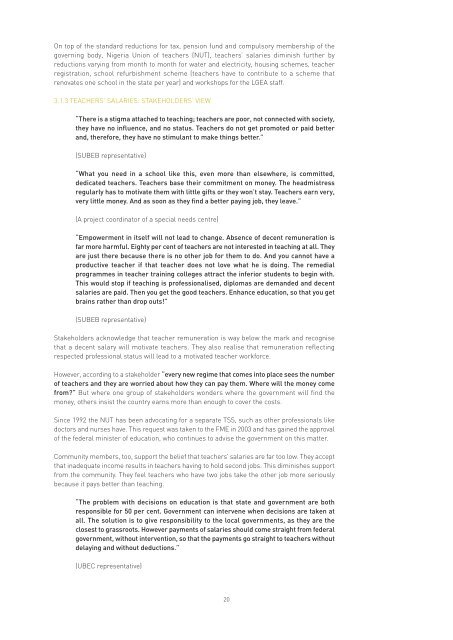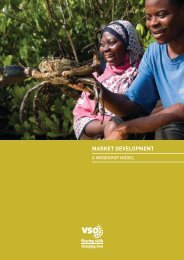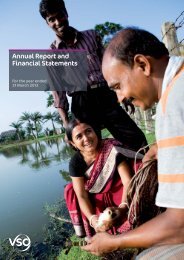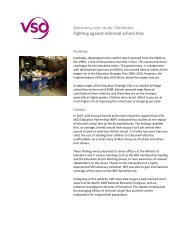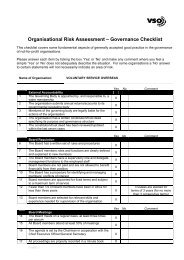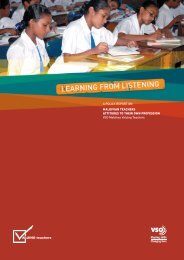Teachers' Voice â Nigeria - VSO
Teachers' Voice â Nigeria - VSO
Teachers' Voice â Nigeria - VSO
- No tags were found...
You also want an ePaper? Increase the reach of your titles
YUMPU automatically turns print PDFs into web optimized ePapers that Google loves.
On top of the standard reductions for tax, pension fund and compulsory membership of thegoverning body, <strong>Nigeria</strong> Union of teachers (NUT), teachers’ salaries diminish further byreductions varying from month to month for water and electricity, housing schemes, teacherregistration, school refurbishment scheme (teachers have to contribute to a scheme thatrenovates one school in the state per year) and workshops for the LGEA staff.3.1.3 TEACHERS’ SALARIES: STAKEHOLDERS’ VIEW“There is a stigma attached to teaching; teachers are poor, not connected with society,they have no influence, and no status. Teachers do not get promoted or paid betterand, therefore, they have no stimulant to make things better.”(SUBEB representative)“What you need in a school like this, even more than elsewhere, is committed,dedicated teachers. Teachers base their commitment on money. The headmistressregularly has to motivate them with little gifts or they won’t stay. Teachers earn very,very little money. And as soon as they find a better paying job, they leave.”(A project coordinator of a special needs centre)“Empowerment in itself will not lead to change. Absence of decent remuneration isfar more harmful. Eighty per cent of teachers are not interested in teaching at all. Theyare just there because there is no other job for them to do. And you cannot have aproductive teacher if that teacher does not love what he is doing. The remedialprogrammes in teacher training colleges attract the inferior students to begin with.This would stop if teaching is professionalised, diplomas are demanded and decentsalaries are paid. Then you get the good teachers. Enhance education, so that you getbrains rather than drop outs!”(SUBEB representative)Stakeholders acknowledge that teacher remuneration is way below the mark and recognisethat a decent salary will motivate teachers. They also realise that remuneration reflectingrespected professional status will lead to a motivated teacher workforce.However, according to a stakeholder “every new regime that comes into place sees the numberof teachers and they are worried about how they can pay them. Where will the money comefrom?” But where one group of stakeholders wonders where the government will find themoney, others insist the country earns more than enough to cover the costs.Since 1992 the NUT has been advocating for a separate TSS, such as other professionals likedoctors and nurses have. This request was taken to the FME in 2003 and has gained the approvalof the federal minister of education, who continues to advise the government on this matter.Community members, too, support the belief that teachers’ salaries are far too low. They acceptthat inadequate income results in teachers having to hold second jobs. This diminishes supportfrom the community. They feel teachers who have two jobs take the other job more seriouslybecause it pays better than teaching.“The problem with decisions on education is that state and government are bothresponsible for 50 per cent. Government can intervene when decisions are taken atall. The solution is to give responsibility to the local governments, as they are theclosest to grassroots. However payments of salaries should come straight from federalgovernment, without intervention, so that the payments go straight to teachers withoutdelaying and without deductions.”(UBEC representative)20


